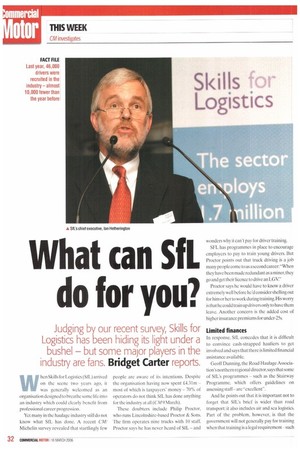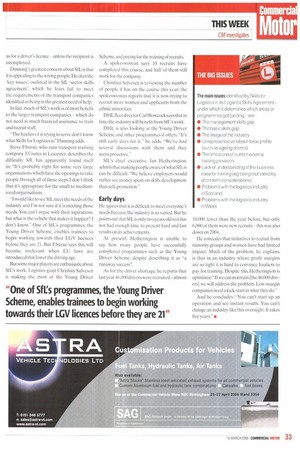What can SfL do for you.
Page 32

Page 33

If you've noticed an error in this article please click here to report it so we can fix it.
Judging by our recent survey, Skills for Logistics has been hiding its light under a bushel — but some major players in the industry are fans. Bridget Carter reports.
When Skills for Logistics (SfL) arrived on the scene two years ago, it was generally welcomed as an organisation designed to breathe some life into an industry which could clearly benefit from professional career progression.
Yet many in the haulage industry still do not know what SfL has done. A recent CM/ Michelin survey revealed that startlingly few people are aware of its intentions. Despite the organisation having now spent £4.31m most of which is taxpayers' money 70% of operators do not think SfL has done anything for the industry at all (CM 9 March).
These doubters include Philip Proctor, who runs Lincolnshire-based Proctor & Sons. The firm operates nine trucks with 10 staff. Proctor says he has never heard of SfL and wonders why it can't pay for driver training.
SFL has programmes in place to encourage employers to pay to train young drivers. But Proctor points out that truck driving is a job many people come to as a second career: "When they have been made redundant as a miner, they go and get their licence to drive an LGV."
Proctor says he would have to know a driver extremely well before he'd consider shelling out for him or her to work during training. His worry isthat he could train upclrivers only to have them leave. Another concern is the added cost of higher insurance premiums for under-25s.
Limited finances
In response, SfL concedes that it is difficult to convince cash-strapped hauliers to get involved and says that there is limited financial assistance available.
Geoff Dunning, the Road Haulage Association's northern regional director, says that some of SfL's programmes such as the Stairway Programme, which offers guidelines on assessing staffare "excellent".
And he points out that it is important not to forget that SfL's brief is wider than road transport: it also includes air and sea logistics. Part of the problem, however, is that the government will not generally pay for training when that training is a legal requirement -such as for a driver's licence unless the recipient is unemployed.
Dunning's greatest concern about SfL is that it is appealing to the wrong people. He cites the 'key issues'. outlined in the SfL 'sector skills agreement', which he fears fail to meet the requirements of the transport companies identified as being in the greatest need of help.
In fact, much of SfL's work is of most benefit to the larger transport companies which do not need as much financial assistance to train and recruit staff.
"The hauliers it is trying to serve don't know what Skills for Logistics is,"Dunning adds.
Steve Eburne, who runs transport training company „I Coates in Leicester, describes the difficulty St L has apparently found itself in: "It's probably right for some very large organisations which have the openings to take people through all of those steps. I don't think that it's appropriate for the small to mediumsized organisations.
"I would like to see SfL meet the needs of the industry and I'm not sure if it is meeting those needs. You can't argue with their aspirations, but what is the vehicle that makes it happen? I don't know." One of SfL's programmes, the Young Driver Scheme, enables trainees to begin working towards their LGV licences before they are 2 I . But Eburne says this will become irrelevant when EU laws are introduced that lower the driving age.
But some major players are enthusiastic about SfL's work. Logistics giant Christian Salvesen is making the most of the Young Driver Scheme, and paying for the training of recruits.
A spokeswoman says 10 recruits have completed this course, and half of them still work for the company.
Christian Salvesen is reviewing the number of people it has on the course this year; the spokeswoman reports that it is now trying to recruit more women and applicants from the ethnic minorities.
DHL fleet director Carl Boweock says that in time the industry will benefit from SfL's work.
DHL is also looking at the Young Driver Scheme and other programmes it offers. "It's still early days for it," he adds. "We've had several discussions with them and they seem proactive."
SfL's chief executive. Ian Hetherington, admits that making people aware of what SIT, is can be difficult; "We believe employers would rather see money spent on skills development than self-promotion."
Early days
He agrees that it is difficult to meet everyone's needs because the industry is so varied. But he points out that SfL is only two years old so it has not had enough time to present hard and fast results on its achievements.
At present, Hetherington is unable to say how many people have successfully completed programmes such as the Young Driver Scheme, despite describing it as "a runaway success".
As for the driver shortage, he reports that last year 46,000 drivers were recruited -almost 10,000 fewer than the year before, but only 6,000 of them were new recruits this was also down on 2004.
lie concedes that initiatives to recruit from minority groups and women have had limited impact. Much of the problem. he explains, is that in an industry where profit margins are so tight it is hard to convince hauliers to pay for training. Despite this, I letherington is optimistic:"If we can maintain [the 46,000 drivers] we will address the problem. Low-margin companies need a kick-start in what they do."
And he concludes; "You can't start up an operation and see instant results. You can't change an industry like this overnight. It takes five years." m
































































































































































































